
| 18.1.2 The referred point of time is not present |
If there is a verb that refers to a different point of time of the imagination or narration than the present tense, the tenses of the reported clauses need to be adjusted. This is the same in French and in English:
| Examples | ||
| They bought a book. | ||
| declarative sentence: | Ils achetèrent (passé simple) un livre. | |
| direct speech : They said, | "We bought [simple past] a book." | |
| Ils dirent (passé simple): | "Nous achetons (passé simple) un livre". | |
| indirect speech: They said | that they had bought [past perfect] a book. | |
| Ils dirent (passé simple) | qu' ils avaient acheté (plus-que-parfait) un livre. | |
| sequence of tenses: They thought | that they had bought [past perfect] a book. | |
| Ils pensèrent (passé simple) | qu' ils avaient acheté (plus-que-parfait)un livre. | |
With the usual tenses we define whether something has happened before it was imagined or reported, at the same time or after that. The same can be done by the change of tenses, if the point of narration or imagination is in the past.
| Overview | |
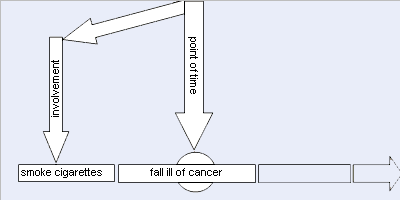 |
|
| 1.a) Reported speech: He said that you smoked so many cigarettes that you would fall ill of cancer. 1.a) Sequence of tenses: I thought that you smoked so many cigarettes that you would fall ill of cancer. |
|
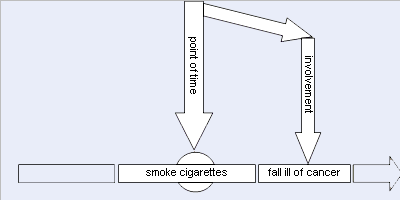 |
|
| 1.b) Reported speech: He will say that you have smoke so many cigarettes that you fell ill of cancer. 1.b) Sequence of tenses: I will think that you have smoke so many cigarettes that you fell ill of cancer. |
|
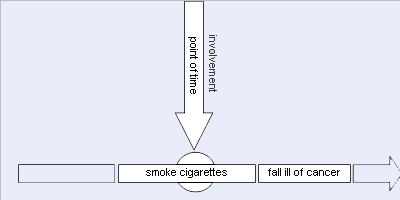 |
|
| 1.c) Reported speech: He says that you smoke so many cigarettes that you will fall ill of cancer. 1.c) Sequence of tenses: I think that you smoke so many cigarettes that you will fall ill of cancer. |
|
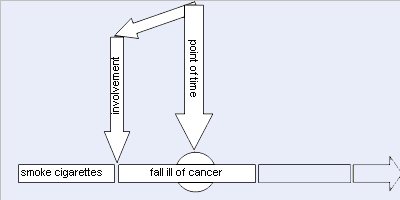 |
|
| 2.a) Reported speech: He said that you had smoked so many cigarettes that you will fall ill of cancer. 2.a) Sequence of tenses: I thought that you had smoked so many cigarettes that you will fall ill of cancer. |
|
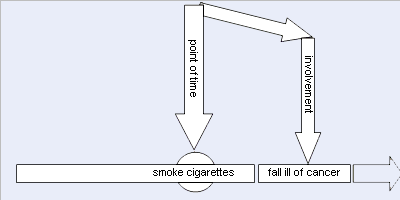 |
|
| 2.b) Reported speech: He will say that you have smoked so many cigarettes that you fall ill of cancer. 2.b) Sequence of tenses: I will think that you have smoked so many cigarettes that you fall ill of cancer. |
|
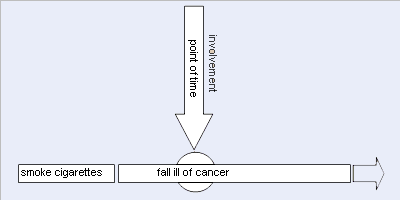 |
|
| 2.c) Reported speech: He says that you have smoked so many cigarettes that you fall ill of cancer. 2.c) Sequence of tenses: I think that you have smoked so many cigarettes that you fall ill of cancer. |
|
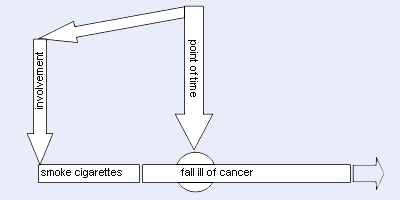 |
|
| 3.a) Reported speech: He said that, if you smoke so many cigarettes that you will fall ill of cancer. 3.a) Sequence of tenses: I thought that, if you smoke so many cigarettes that you will fall ill of cancer. |
|
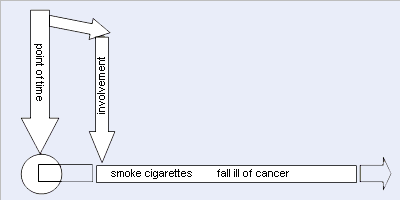 |
|
| 3.b) Reported speech: He will say that, if you will smoke so many cigarettes that you will fall ill of cancer. 3.b) Sequence of tenses: I will think that, if you will smoke so many cigarettes that you will fall ill of cancer. |
|
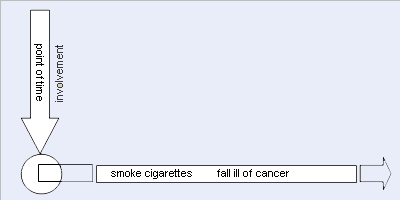 |
|
| 3.c) Reported speech: He says that, if you will smoke so many cigarettes that you will fall ill of cancer. 3.c) Sequence of tenses: I think that, if you will smoke so many cigarettes that you will fall ill of cancer. |
|
We have shown now many different options (there are surely more of them). However, it is important to see that only whenever the point of mental involvement and point of narration is the same the construction is unchanged. Also unchanged are tenses, if the introductory verb is in a present tense (présent, futur simple, futur composé, conditionnel présent); the usual rules of the use of tenses apply here.
Is the introductory verb in a past tense (imparfait, passé composé, passé simple, plus que parfait, conditionnel passé), then the tenses of the reported clauses are to be changed.
| contact privacy statement imprint |